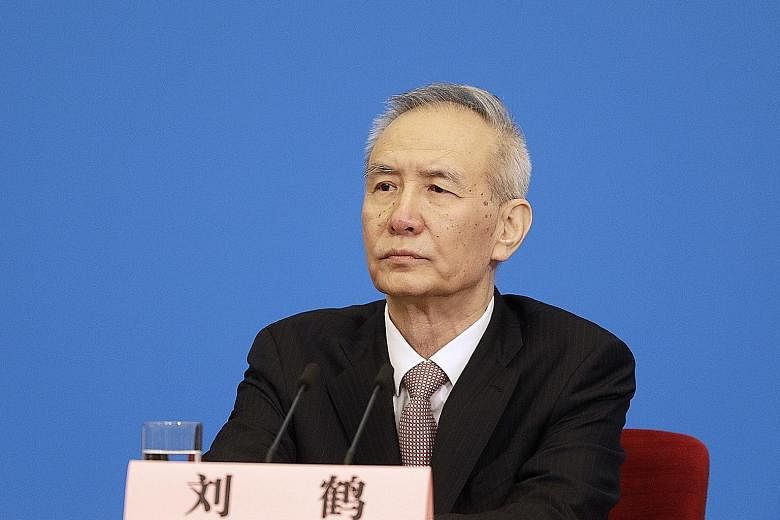Chinese Vice-Premier Liu He is in Washington for two days of crucial talks with the United States aimed at staving off a deeper phase in the trade war that could begin on March 1 if no agreement is reached by then.
The talks starting today come after the US Justice Department unveiled charges against Chinese technology giant Huawei, its chief financial officer Meng Wanzhou and several subsidiaries on Monday. The charges include theft of trade secrets, obstruction of justice and bank fraud related to evading economic sanctions on Iran.
Separately, China is challen-ging US tariffs at the World Trade Organisation.
The clock on trade is ticking. China and the US are struggling to reach an agreement not only on narrowing the US' yawning trade deficit with China, but also on structural changes to the Chinese economy to, among other things, curb forced joint ventures with and technology transfer from US firms, and allow them more access to China's market.
Failure to strike a deal could see the US raise tariffs on US$200 billion (S$270 billion) worth of Chinese imports - from 10 per cent to 25 per cent - come March 1.
There is cautious optimism that an agreement will emerge.
"My baseline assumption is that very close to the deadline, we will come up with a deal that... at least allows both sides some breathing room by de-escalating hostilities," Professor Eswar Prasad, former China director at the International Monetary Fund, said in a speech in Washington last week.
China said yesterday it hoped the trade teams would "actively work together and follow the important consensus of the leaders of the two countries to achieve a mutually acceptable solution".
"I think this is the common expectation of the international community," Foreign Ministry spokes-man Geng Shuang told reporters.
For sure, nervous markets will be looking for positive signals. Yet, many analysts say the deep structural changes asked of China are too fundamental to deliver.
The trade talks, coming after official-level meetings in Beijing earlier this month, are part of negotiations agreed to by US President Donald Trump and Chinese President Xi Jinping last month - which led to a 90-day conditional truce in which neither side would raise tariffs.
"The two sides will... discuss China's pledge to purchase a substantial amount of goods and services from the United States," the White House said in a statement.
The US side is led by US Trade Representative Robert Lighthizer and the Chinese side by Mr Liu, who is a key economic adviser to Mr Xi.
The talks cover four broad areas. A relatively easy one is how much and what US products and produce China will commit to buying to narrow America's trade deficit. The second area is what China can do to show progress on deregulation.
The third addresses structural issues in China - market access, intellectual property issues and the China 2025 vision, which aims to make the country a global technology power by 2025. The fourth area is enforcement of any deal.
The last two are considered the most contentious.
On Monday, US Treasury Secretary Steven Mnuchin, who will take part in the talks, told journalists: "We do have another 30 days after this, so my expectation is we will make significant progress at these meetings, but I would just emphasise these are complicated issues."
Enforcement will be a topic on the agenda, he said. "We want to make sure that we expect when we get a deal, that deal will be enforced."
Since the Dec 1 meeting between the two presidents, China has taken several measures.
According to a compilation by trade and business consultancy McLarty Associates, these include approving imports of five genetically modified crops, the first-ever approved imports of American rice, large orders of soya beans, accelerated approval of foreign pharmaceutical drugs, cancelled or lowered tariffs on some imports, setting up of an intellectual property rights court under the Supreme Court and promises to review foreign investment laws.
Yesterday, Industry and Information Technology Minister Miao Wei said China has removed ratio limits to foreign capital investment in shipbuilding, aviation and other technical equipment manufacture.
China has done "more than usual, that is all positive", said McLarty Associates managing partner Kellie Meiman Hock. "The question at the end of the day is: Is it enough for Bob Lighthizer, and is it enough for Donald Trump at a time when he is concerned about markets?"
• Additional reporting by Lim Yan Liang

